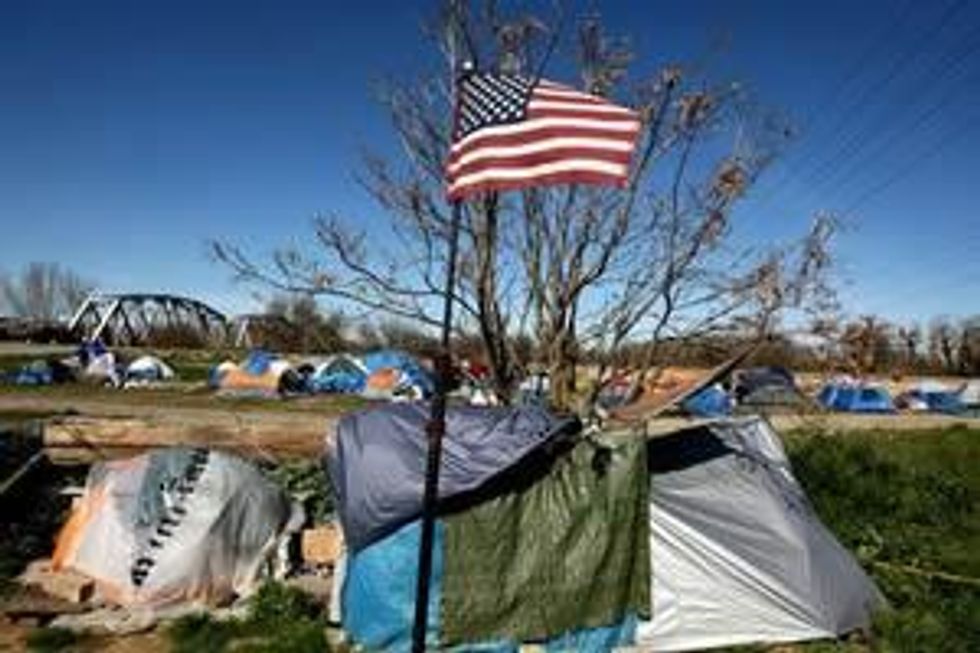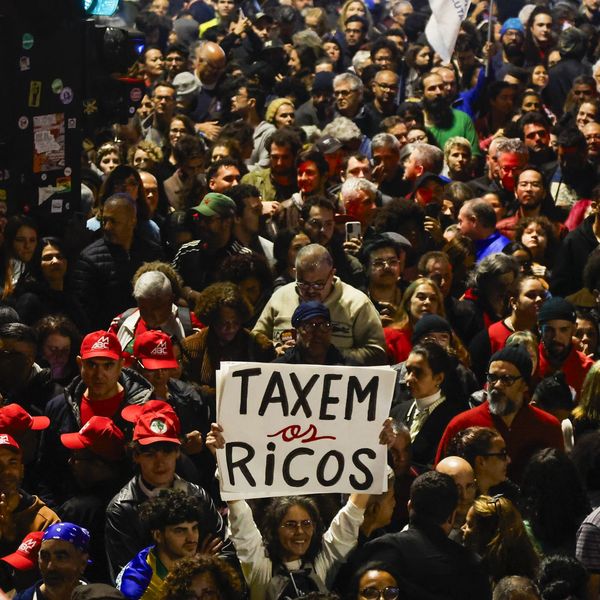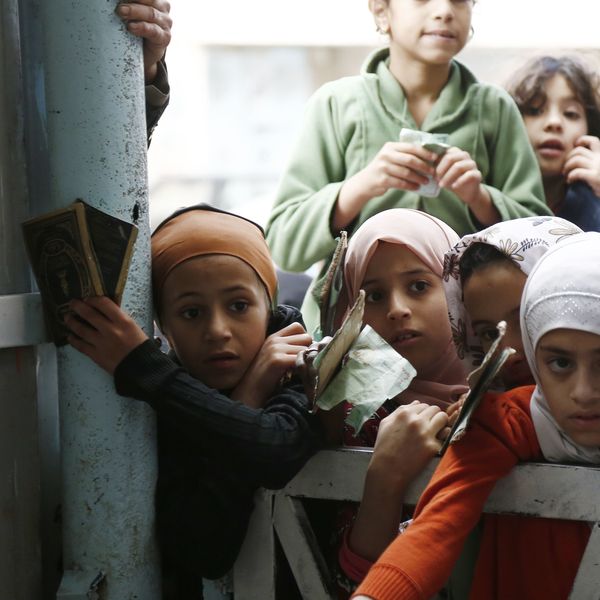We Ignore Poverty, But It Is On the Rise
Poor people are invisible in our nation's capital. Republicans defend the affluent, calling them "job creators," Democrats champion the middle class and those boldest stand with "working families." The poor go without mention.
Poor people are invisible in our nation's capital. Republicans defend the affluent, calling them "job creators," Democrats champion the middle class and those boldest stand with "working families." The poor go without mention.

The Great Recession is the immediate cause. Twenty-five million people are in need of full-time work; 49 million go without health insurance. A good many of the poor have jobs, but receive too little pay to lift their family up from poverty. But poverty was rising even before the latest economic collapse; the middle class has been losing ground for more than 30 years.
Poverty is destructive. The poor are more likely to be sick, vulnerable from hunger, to lack prenatal and infant care and to contract diseases that go undiagnosed. But if being poor makes Americans sick, getting sick too often makes them poor. Serious illness is the leading cause of bankruptcy.
Poverty destroys hope. A hungry child finds it hard to learn. A toothache drowns out a teacher's voice. As poverty rates increase, the number of dropouts rises.
Poverty destroys neighborhoods. Foreclosed homes become drug dens. The desperate turn to crime. Exploiters -- the payday lenders, the sub-prime peddlers -- target the vulnerable.
The poor are less likely to have access to transportation that might take them to a job. They are less likely to have access to affordable groceries. They are more likely to go to an under-funded school, from which the best teachers have fled. The working poor are more likely to be in debt, more likely to live paycheck to paycheck.
The poor, we're taught to believe, will always be with us. But we know how to reduce poverty. When Lyndon Johnson launched the war on poverty, millions were given hope. The Job Corps, Head Start, Medicare and Medicaid, food stamps, the Teacher Corps, a rising minimum wage, and much more -- these programs worked.
As Joseph A. Califano Jr., former secretary of the Department of Health, Education and Welfare summarizes: ". . . from 1963 when Lyndon Johnson took office until 1970 as the impact of his Great Society programs were felt, the portion of Americans living below the poverty line dropped from 22.2 percent to 12.6 percent, the most dramatic decline over such a brief period in this century."
Yet today Johnson is forgotten, even among Democrats. The war on poverty was lost in the jungles of Vietnam. As Dr. King warned, the bombs dropped on Vietnam exploded in the streets of America's cities.
And we've made that same disastrous choice over and over again. So politicians in both parties supported the wrong war in Iraq, which has cost more than $1 trillion and counting, while dismissing programs for the poor here at home as a waste. There is no better measure of a country that has lost its way.
Now the Super Committee in Washington is meeting to figure out how to reduce the deficit. Republican House Speaker John Boehner dismissed the president's call for raising taxes on millionaires, insisting that the committee should focus on rolling back Social Security, Medicare and Medicaid.
We have a health-care system that is twice as expensive, per capita, as those in other industrial nations, captured by the drug lobby and the insurance and private hospital industries -- and instead of taking on those interests, Boehner wants to argue about how to cut protection for the most vulnerable.
The debate is too limited. The pain is intensifying. We need a White House Commission on poverty, malnutrition and human need. Only the president has the platform to ignite this debate and Congress has the moral burden to close ranks behind his leadership and lift millions out of the sinking sand of poverty. We profess to be a moral nation, moreover a Christian nation, our character measured by how we treat the lost, least and left behind. We need to stop fighting unnecessary wars and start feeding children in our cities. We need to go back to Appalachia where Lyndon Baines Johnson launched the war on poverty and from that place go to the zones of human need across the country. Let's honor the American promise to provide for the huddled masses that are tired, poor and yearn to breathe free.
An Urgent Message From Our Co-Founder
Dear Common Dreams reader, The U.S. is on a fast track to authoritarianism like nothing I've ever seen. Meanwhile, corporate news outlets are utterly capitulating to Trump, twisting their coverage to avoid drawing his ire while lining up to stuff cash in his pockets. That's why I believe that Common Dreams is doing the best and most consequential reporting that we've ever done. Our small but mighty team is a progressive reporting powerhouse, covering the news every day that the corporate media never will. Our mission has always been simple: To inform. To inspire. And to ignite change for the common good. Now here's the key piece that I want all our readers to understand: None of this would be possible without your financial support. That's not just some fundraising cliche. It's the absolute and literal truth. We don't accept corporate advertising and never will. We don't have a paywall because we don't think people should be blocked from critical news based on their ability to pay. Everything we do is funded by the donations of readers like you. Will you donate now to help power the nonprofit, independent reporting of Common Dreams? Thank you for being a vital member of our community. Together, we can keep independent journalism alive when it’s needed most. - Craig Brown, Co-founder |
Poor people are invisible in our nation's capital. Republicans defend the affluent, calling them "job creators," Democrats champion the middle class and those boldest stand with "working families." The poor go without mention.

The Great Recession is the immediate cause. Twenty-five million people are in need of full-time work; 49 million go without health insurance. A good many of the poor have jobs, but receive too little pay to lift their family up from poverty. But poverty was rising even before the latest economic collapse; the middle class has been losing ground for more than 30 years.
Poverty is destructive. The poor are more likely to be sick, vulnerable from hunger, to lack prenatal and infant care and to contract diseases that go undiagnosed. But if being poor makes Americans sick, getting sick too often makes them poor. Serious illness is the leading cause of bankruptcy.
Poverty destroys hope. A hungry child finds it hard to learn. A toothache drowns out a teacher's voice. As poverty rates increase, the number of dropouts rises.
Poverty destroys neighborhoods. Foreclosed homes become drug dens. The desperate turn to crime. Exploiters -- the payday lenders, the sub-prime peddlers -- target the vulnerable.
The poor are less likely to have access to transportation that might take them to a job. They are less likely to have access to affordable groceries. They are more likely to go to an under-funded school, from which the best teachers have fled. The working poor are more likely to be in debt, more likely to live paycheck to paycheck.
The poor, we're taught to believe, will always be with us. But we know how to reduce poverty. When Lyndon Johnson launched the war on poverty, millions were given hope. The Job Corps, Head Start, Medicare and Medicaid, food stamps, the Teacher Corps, a rising minimum wage, and much more -- these programs worked.
As Joseph A. Califano Jr., former secretary of the Department of Health, Education and Welfare summarizes: ". . . from 1963 when Lyndon Johnson took office until 1970 as the impact of his Great Society programs were felt, the portion of Americans living below the poverty line dropped from 22.2 percent to 12.6 percent, the most dramatic decline over such a brief period in this century."
Yet today Johnson is forgotten, even among Democrats. The war on poverty was lost in the jungles of Vietnam. As Dr. King warned, the bombs dropped on Vietnam exploded in the streets of America's cities.
And we've made that same disastrous choice over and over again. So politicians in both parties supported the wrong war in Iraq, which has cost more than $1 trillion and counting, while dismissing programs for the poor here at home as a waste. There is no better measure of a country that has lost its way.
Now the Super Committee in Washington is meeting to figure out how to reduce the deficit. Republican House Speaker John Boehner dismissed the president's call for raising taxes on millionaires, insisting that the committee should focus on rolling back Social Security, Medicare and Medicaid.
We have a health-care system that is twice as expensive, per capita, as those in other industrial nations, captured by the drug lobby and the insurance and private hospital industries -- and instead of taking on those interests, Boehner wants to argue about how to cut protection for the most vulnerable.
The debate is too limited. The pain is intensifying. We need a White House Commission on poverty, malnutrition and human need. Only the president has the platform to ignite this debate and Congress has the moral burden to close ranks behind his leadership and lift millions out of the sinking sand of poverty. We profess to be a moral nation, moreover a Christian nation, our character measured by how we treat the lost, least and left behind. We need to stop fighting unnecessary wars and start feeding children in our cities. We need to go back to Appalachia where Lyndon Baines Johnson launched the war on poverty and from that place go to the zones of human need across the country. Let's honor the American promise to provide for the huddled masses that are tired, poor and yearn to breathe free.
Poor people are invisible in our nation's capital. Republicans defend the affluent, calling them "job creators," Democrats champion the middle class and those boldest stand with "working families." The poor go without mention.

The Great Recession is the immediate cause. Twenty-five million people are in need of full-time work; 49 million go without health insurance. A good many of the poor have jobs, but receive too little pay to lift their family up from poverty. But poverty was rising even before the latest economic collapse; the middle class has been losing ground for more than 30 years.
Poverty is destructive. The poor are more likely to be sick, vulnerable from hunger, to lack prenatal and infant care and to contract diseases that go undiagnosed. But if being poor makes Americans sick, getting sick too often makes them poor. Serious illness is the leading cause of bankruptcy.
Poverty destroys hope. A hungry child finds it hard to learn. A toothache drowns out a teacher's voice. As poverty rates increase, the number of dropouts rises.
Poverty destroys neighborhoods. Foreclosed homes become drug dens. The desperate turn to crime. Exploiters -- the payday lenders, the sub-prime peddlers -- target the vulnerable.
The poor are less likely to have access to transportation that might take them to a job. They are less likely to have access to affordable groceries. They are more likely to go to an under-funded school, from which the best teachers have fled. The working poor are more likely to be in debt, more likely to live paycheck to paycheck.
The poor, we're taught to believe, will always be with us. But we know how to reduce poverty. When Lyndon Johnson launched the war on poverty, millions were given hope. The Job Corps, Head Start, Medicare and Medicaid, food stamps, the Teacher Corps, a rising minimum wage, and much more -- these programs worked.
As Joseph A. Califano Jr., former secretary of the Department of Health, Education and Welfare summarizes: ". . . from 1963 when Lyndon Johnson took office until 1970 as the impact of his Great Society programs were felt, the portion of Americans living below the poverty line dropped from 22.2 percent to 12.6 percent, the most dramatic decline over such a brief period in this century."
Yet today Johnson is forgotten, even among Democrats. The war on poverty was lost in the jungles of Vietnam. As Dr. King warned, the bombs dropped on Vietnam exploded in the streets of America's cities.
And we've made that same disastrous choice over and over again. So politicians in both parties supported the wrong war in Iraq, which has cost more than $1 trillion and counting, while dismissing programs for the poor here at home as a waste. There is no better measure of a country that has lost its way.
Now the Super Committee in Washington is meeting to figure out how to reduce the deficit. Republican House Speaker John Boehner dismissed the president's call for raising taxes on millionaires, insisting that the committee should focus on rolling back Social Security, Medicare and Medicaid.
We have a health-care system that is twice as expensive, per capita, as those in other industrial nations, captured by the drug lobby and the insurance and private hospital industries -- and instead of taking on those interests, Boehner wants to argue about how to cut protection for the most vulnerable.
The debate is too limited. The pain is intensifying. We need a White House Commission on poverty, malnutrition and human need. Only the president has the platform to ignite this debate and Congress has the moral burden to close ranks behind his leadership and lift millions out of the sinking sand of poverty. We profess to be a moral nation, moreover a Christian nation, our character measured by how we treat the lost, least and left behind. We need to stop fighting unnecessary wars and start feeding children in our cities. We need to go back to Appalachia where Lyndon Baines Johnson launched the war on poverty and from that place go to the zones of human need across the country. Let's honor the American promise to provide for the huddled masses that are tired, poor and yearn to breathe free.

